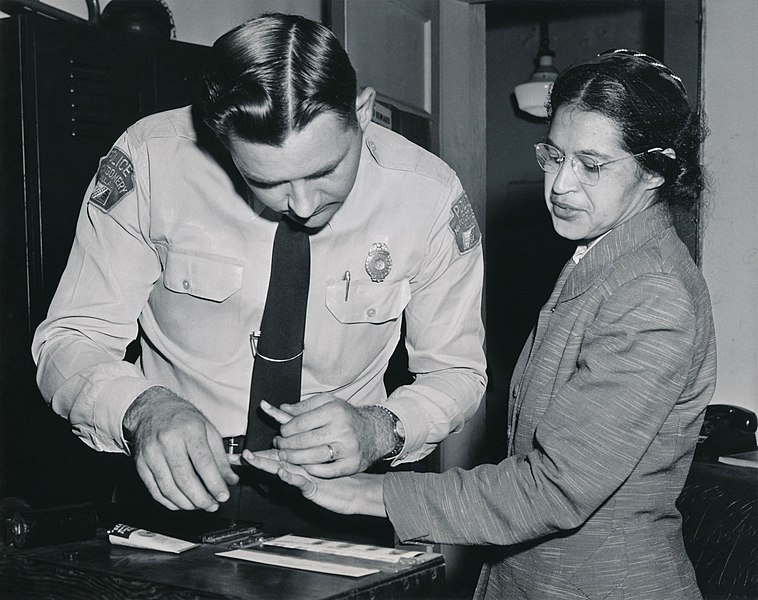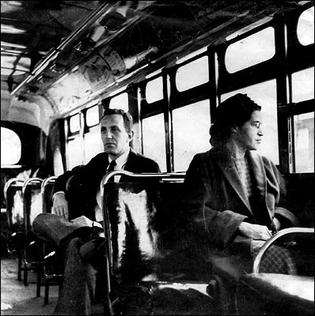Rosa Parks was a prominent figure in the American civil rights movement, born on February 4, 1913, in Tuskegee, Alabama. She is best known for her refusal to give up her seat to a white passenger on a segregated bus in Montgomery, Alabama, on December 1, 1955.
This act of defiance sparked the Montgomery Bus Boycott, a pivotal event in the fight against racial segregation. Parks’ bravery and activism made her an iconic symbol of resistance and inspired countless individuals in their pursuit of civil rights and social justice.
Her legacy continues to serve as a powerful reminder of the impact one individual can have in bringing about meaningful change.
Rosa Parks Facts
1. Rosa Parks was born on February 4, 1913
Rosa Louise McCauley Parks was born on February 4, 1913, in Tuskegee, Alabama. She grew up in a racially segregated and discriminatory society where African Americans faced numerous injustices.
2. She refused to give up her bus seat on December 1, 1955
On December 1, 1955, Rosa Parks, a 42-year-old African American woman, boarded a segregated bus in Montgomery, Alabama, to return home from work.
Also Read: Rosa Parks Accomplishments
As the bus filled up, the driver demanded that she give up her seat to a white passenger. Parks, who had grown tired of enduring discrimination, refused to comply with the unjust demand.

3. Her act of defiance sparked the Montgomery Bus Boycott
Rosa Parks’ refusal to give up her seat ignited a powerful resistance movement known as the Montgomery Bus Boycott. Her arrest and subsequent trial garnered significant attention and sparked outrage within the African American community.
Led by figures such as Martin Luther King Jr., the boycott lasted for 381 days, during which African Americans organized carpools, walked long distances, or used alternative means of transportation.
Also Read: Timeline of Rosa Parks Life
The boycott put economic pressure on the bus company and brought attention to the issue of racial segregation in public transportation.
Ultimately, the U.S. Supreme Court ruled in 1956 that segregation on public buses was unconstitutional. The Montgomery Bus Boycott marked a significant turning point in the civil rights movement and established Rosa Parks as a symbol of courage and resistance against racial injustice.
4. Parks was an experienced civil rights activist
Rosa Parks had a long history of civil rights activism even before her famous act of defiance on the bus. She served as the secretary of the Montgomery chapter of the National Association for the Advancement of Colored People (NAACP).
Parks worked alongside other activists to challenge segregation and fight for equal rights for African Americans in Montgomery.
5. She moved to Detroit, Michigan, in 1957
After the intense backlash and difficulties faced by Rosa Parks and her husband following the Montgomery Bus Boycott, they decided to leave Alabama.
In 1957, they relocated to Detroit, Michigan, seeking a fresh start and hoping to escape the threats and economic challenges they had experienced in Montgomery. Detroit offered more opportunities for employment and a relatively more tolerant atmosphere.
6. Parks worked for U.S. Representative John Conyers, Jr
In Detroit, Rosa Parks became actively involved in community and political work. She worked as a secretary and receptionist for U.S. Representative John Conyers, Jr., who represented Michigan’s 13th congressional district.
Parks served in this role for over two decades, from 1965 to 1988. During her time with Conyers, she continued to be engaged in civil rights activities, advocating for social justice and equality for all Americans. Her work with Conyers allowed her to have a lasting impact on various issues affecting the community.

7. She co-founded the Rosa and Raymond Parks Institute for Self Development
In 1987, Rosa Parks, along with Elaine Eason Steele, co-founded the Rosa and Raymond Parks Institute for Self Development. The institute was established to empower young people and promote civil rights education.
It aimed to provide opportunities for personal growth, leadership development, and career guidance. Through various programs, workshops, and scholarships, the institute sought to inspire and uplift the youth, encouraging them to become agents of positive change in their communities.
8. Parks received the Presidential Medal of Freedom in 1996
In recognition of her significant contributions to the civil rights movement and her lifelong commitment to equality and justice, Rosa Parks was awarded the Presidential Medal of Freedom, the highest civilian award in the United States.
President Bill Clinton presented her with this prestigious honor in 1996. The medal symbolized the nation’s gratitude and admiration for her courage, determination, and unwavering dedication to the pursuit of civil rights and social progress.
9. She published an autobiography titled “Rosa Parks: My Story” in 1992
In 1992, Rosa Parks published her autobiography, titled “Rosa Parks: My Story.” Co-written with Jim Haskins, the book provides a firsthand account of her life, experiences, and her pivotal role in the civil rights movement.
Parks narrates her childhood, the events leading up to the Montgomery Bus Boycott, and the subsequent impact it had on her life.
The autobiography offers valuable insights into her motivations, struggles, and the broader context of racial segregation and discrimination in America. The book serves as an important historical document, preserving Parks’ legacy and inspiring readers to stand up against injustice.
10. Parks’ refusal to give up her seat inspired other activists
Rosa Parks’ courageous act of refusing to give up her seat on the bus became a symbol of resistance against racial segregation and sparked inspiration among other civil rights activists.
Her actions encouraged countless individuals to stand up against injustice and discrimination. Parks’ act served as a catalyst for the broader civil rights movement, inspiring further acts of nonviolent protest, civil disobedience, and social change.
11. She is considered a catalyst for the civil rights movement
Rosa Parks’ refusal to surrender her seat on the bus played a pivotal role in galvanizing the civil rights movement of the 1950s and 1960s.
Her act, coupled with the subsequent Montgomery Bus Boycott, drew national attention to the racial inequalities and discriminatory practices that African Americans endured daily.
Parks’ bravery and determination sparked a momentum that led to significant strides in the fight for desegregation, voting rights, and equal treatment under the law.
12. Rosa Parks passed away on October 24, 2005
After a lifetime dedicated to the pursuit of justice and equality, Rosa Parks passed away on October 24, 2005, at the age of 92 in Detroit, Michigan. Her death marked the end of an era, but her legacy continues to resonate with people worldwide.
Her contributions to the civil rights movement remain a powerful reminder of the impact one individual can have in challenging systemic injustices and fighting for a more equitable society.
13. Her legacy continues to inspire generations fighting for civil rights
Rosa Parks’ legacy endures as an inspiration for future generations in their ongoing struggle for civil rights and social justice. Her unwavering commitment to equality serves as a reminder that one person’s actions can ignite significant change.
Parks’ courage, resilience, and steadfast determination continue to inspire individuals and organizations working to dismantle racism, discrimination, and inequality. Her story reminds us of the importance of standing up against injustice and fighting for a more inclusive and equitable world.
